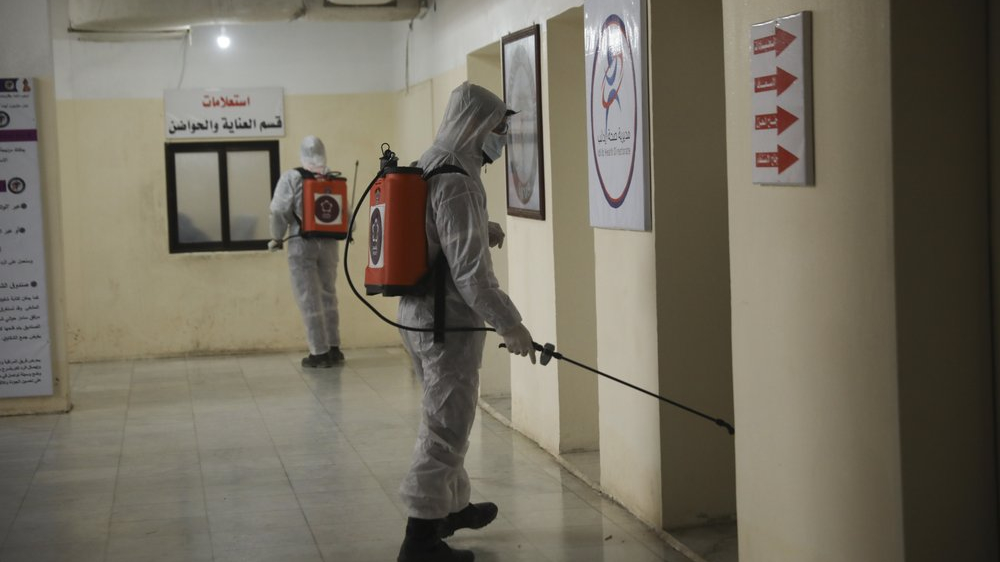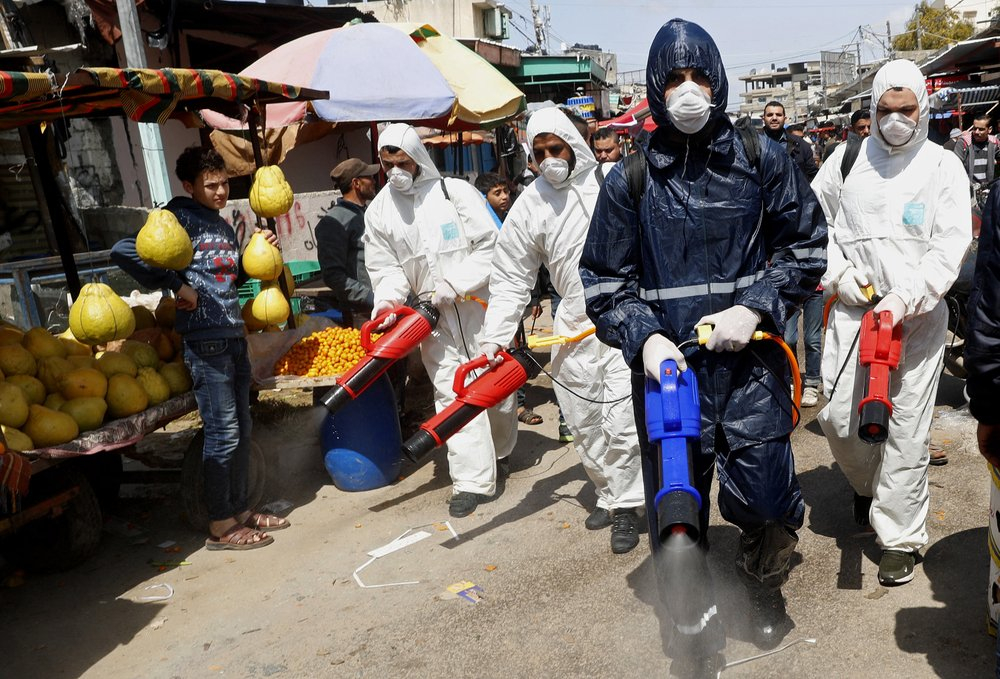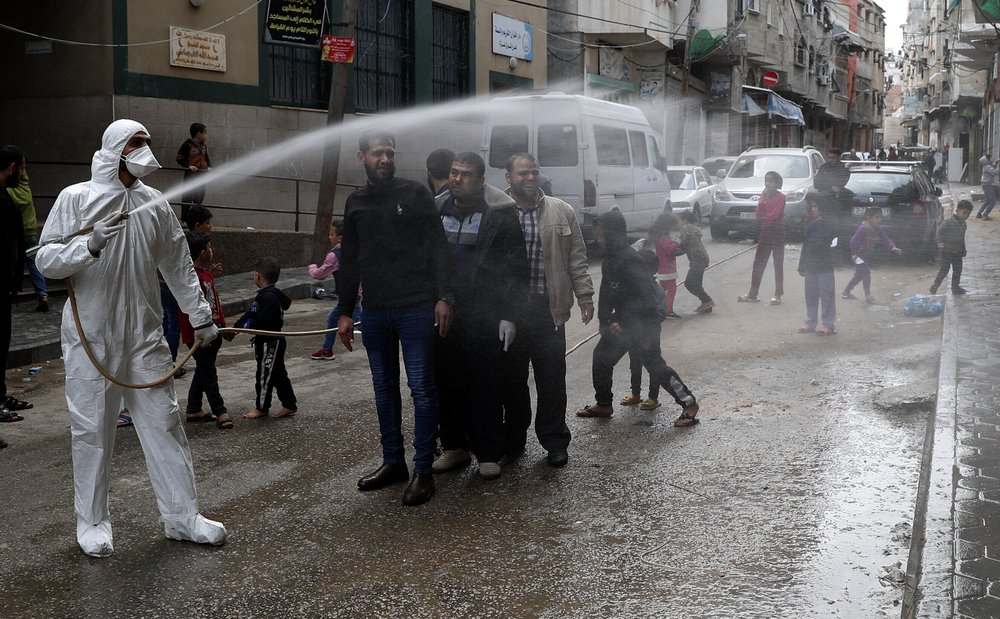
Members of a humanitarian aid agency disinfect Ibn Sina hospital as prevention against coronavirus in the city of Idlib, Syria, March 19, 2020. /AP
Members of a humanitarian aid agency disinfect Ibn Sina hospital as prevention against coronavirus in the city of Idlib, Syria, March 19, 2020. /AP
On Sunday, both Gaza Strip and Syria reported their first cases of coronavirus, raised fears that the pandemic may soon prey on some of the most vulnerable populations in the world.
Authorities in Gaza, which has been under an Israeli and Egyptian blockade since the Islamic militant group Hamas seized power from rival Palestinian forces in 2007, confirmed its first two cases overnight, in returnees who had come from Pakistan.
An outbreak could wreak havoc on the Palestinian territory, which is home to over two million people, many living in cramped cities and refugee camps.
Abdelnasser Soboh, director of the World Health Organization's Gaza office, said the territory only has 62 ventilators, with all but 15 already in use. He estimates the territory needs 50 to 100 more to address an outbreak.
With its current capacity, he estimated Gaza's hospitals can handle the first 100 cases if they come in gradually. "If there is a spread to hundreds, this will cause a challenge to the health care system," he said.
Hundreds of Gazans have returned home in the past two weeks, but only 92 people have been examined. More than 1,270 people have been quarantined at hospitals, hotels and schools after crossing into Gaza from Israel and Egypt.
Related reading:
First cases reported in Gaza amid tight cooperation

Workers wearing protective gear spray disinfectant as a precaution against the coronavirus, at the main market in Gaza City, March 19, 2020. /AP
Workers wearing protective gear spray disinfectant as a precaution against the coronavirus, at the main market in Gaza City, March 19, 2020. /AP
In Syria, Health Minister Nizar Yazigi announced the first confirmed coronavirus case Sunday. The 20-year-old woman came to Syria from a country that has an outbreak of the virus, but Yazigi did not specify which country.
There have been unconfirmed reports in recent weeks of coronavirus cases in Syria, whose health system, housing and infrastructure have been ravaged by nine years of civil war, but authorities have denied any outbreak.
Syria has said it's taking strict precautions to limit the spread of the pandemic in government-controlled areas, including closing down all restaurants and cafes and scaling back the work of government ministries.
Currently, Assad's government has largely won the war militarily, with only one remaining rebel stronghold in the country's northwestern Idlib province.
But Syria has for years been under sanctions by the U.S. and the EU. In the past year, living conditions in Syria have become steadily worse as the Trump administration tightened sanctions, after also re-imposing crushing sanctions on Syria's chief regional ally Iran. Last week, a statement by the Syrian Foreign Ministry called for the immediate lifting of these sanctions to allow countries like Syria and Iran to deal with the outbreak.
The worst outbreak in the region is in Iran, where the government has reported more than 21,600 cases and 1,685 deaths.
Ayatollah Ali Khamenei, Iran's supreme leader, on Sunday refused U.S. assistance to fight the novel coronavirus, citing an unfounded conspiracy theory that the virus could have been created by Americans.
Afghanistan reported its first death on Sunday, a man in his forties. The war-ravaged country has reported 34 confirmed cases.
The U.S. commander in Afghanistan is halting American and allied troops from both entering or exiting the country, which aims to protect the forces from the coronavirus. But, in turn, it may complicate the drawdown of troops, which is the main provision signed between Trump administration and Taliban last month.
The NATO and coalition forces, with roughly 8,700 troops on the ground, announced there is no coronavirus cases among the personnel and they intended to "continue to implement the decision to reduce the number of NATO personnel in Afghanistan," said Secretary-General Jens Stoltenberg on a NATO press conference last week.
"At the same time, we will make sure that we do that in a way which is responsible and which protects the health and the safety of our personnel," Stoltenberg added.
Meanwhile, the U.S. special representative Zalmay Khalilzad stressed the urgency of the prisoner releases amid the coronavirus threat, which is both a health threat considering the over-crowded jails and a crucial starting point for the intra-Afghan negotiations, and a comprehensive and permanent ceasefire.
Related reading:
COVID-19 Global Roundup: The impact of coronavirus on prisons

A worker wearing protective gear sprays disinfectant as a precaution against the coronavirus, in Gaza City, March 19, 2020. /AP
A worker wearing protective gear sprays disinfectant as a precaution against the coronavirus, in Gaza City, March 19, 2020. /AP
There are similar concerns about a catastrophe if the virus turns up in Libya or Yemen, which are both divided by civil wars that have ruined their healthcare systems.
In Libya, rival governments have been at war for almost a year, displacing tens of thousands in and around the capital. The dueling governments are each taking measures to prevent an outbreak, suspending public transportation, closing mosques, schools and shops, and imposed a nightly curfew.
Libya has been mired in chaos since the 2011 uprising, and hosts an estimated 50,000 refugees and migrants from other countries hoping to cross the Mediterranean to Europe. Many are detained in squalid, overcrowded detention centers.
Yemen is also a source of concern. The country is already reeling from five years of civil war as well as cholera outbreaks that have infected more than two million people and killed nearly 4,000 since 2016.
The Houthi rebels – who control the capital, Sanaa, and much of the north – on Sunday banned all gatherings of more than eight people and said 80 percent of civil servants and public sector employees could work from home.
(With input from agencies)